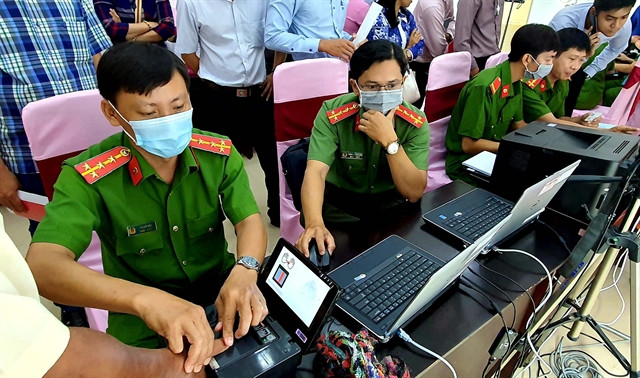 |
| A local resident in Sóc Trăng Province is getting his fingerprint scanned for the making of the identity card. — VNA/VNS Photo |
The Government has submitted a report to the National Assembly on the draft Law on Identity, which is the new name of the revised Law on Citizenship Identity.
With the change of the name, the new draft law will expand the scope of application compared to current regulations, including people of Vietnamese origin living in Việt Nam but whose nationality has not yet been determined.
The draft supplements regulations on identity certificates and the management of people of Vietnamese origin, and provides identity certificates to these people.
The draft also sets out the principles of identity management, the national database on population and identity, rights and obligations of people regarding identity, the national population and identity database as well as the protection of personal data and people's rights related to electronic identity.
The draft will expand and integrate other information of citizens and people of Vietnamese origin in national and specialised databases.
The goal is to serve the application of identity cards, electronic identification, and the connection and sharing of people's information.
Regarding the contents shown on the identity card, the draft law will be adjusted and supplemented in the direction of removing fingerprints, changing an identification card number to a personal identification number, the word "citizen identity" to "identification card", hometown to place of birth registration, and permanent residence to residence.
People's identity information will be stored and used through electronic chips on the identity cards.
ID cards for people under 14
The draft also stipulates the issuance of identity cards for people under 14, and identity certificates to people of Vietnamese origin to ensure their legitimate rights and interests and to serve state management as well.
However, the issuance of ID cards to people under 14 will be done on demand, and for people aged 14 and over is mandatory.
The information integrated in the ID card will be used to provide information about people and replace the presentation of other documents.
In case of card re-issuance or change, it will be done online. The authorised agency will use the information of the latest ID cards to re-issue new ones within seven working days.
The Government believes that the above changes will make it more convenient for people to use identity cards, limit the need to change identity cards and ensure the privacy of people.
According to the Government’s report, each citizen will have only one electronic identity card.
This is an electronic identity account created by an electronic identification and authentication system.
The implementation of administrative procedures and public administrative services in electronic platforms must use electronic identification cards.
The citizen IDs issued before the effective date of this revised law are still valid until the expiry date indicated on the card.
The valid nine-digit identity card issued before the effective date of the law can be used until the end of December 31, 2024.
Issued legal papers using information from the nine-digit identity cards and citizen identification cards remain valid. — VNS